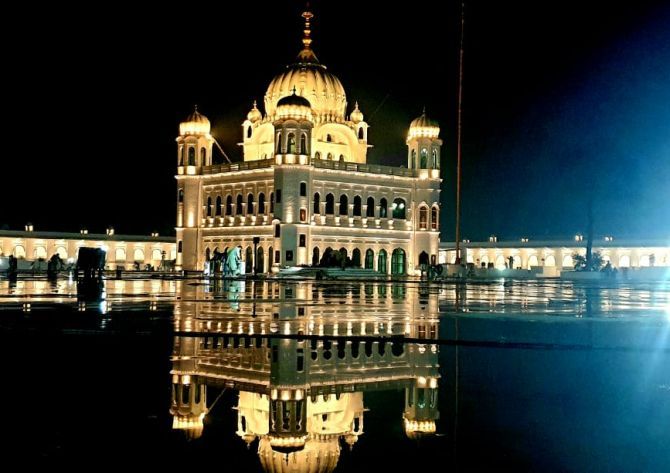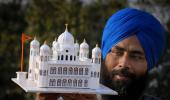'Pakistan has stolen from the Indian diplomatic toolbox a potent rope trick -- bypassing the ruling elite in Delhi (and the Indian establishment) to reach out to Indian Sikhs directly and foster people-to-people contacts,' points out Ambassador M K Bhadrakumar.

A lot of bad blood has surfaced out of the cauterised wound of the India-Pakistan relationship in the wake of the Kartarpur Corridor inauguration on Saturday, November 9.
This wasn't how things were supposed to be when Atal Bihari Vajpayee and Nawaz Sharif first mooted the tantalising, visionary idea. Politicians are unable to handle what is indeed a historic development. This happens when small men grapple with momentous situations and struggle visibly to cope with it.
However, this is not the day to apportion blame, but one can say with reasonable objectivity that Pakistan's handling of the run-up to this moment has been spectacular.
By the yardstick of the subcontinent's abysmal efficiency quotient, Pakistan has done a marvellous job in preparing in record time the Kartarpur shrine and its premises and surroundings to create a grand setting for the Sikh pilgrims who are expected to pour in from all corners of the planet.
The fact that Pakistan showed the magnanimity to sequester the project from the debris falling on it from the Modi government's stunning decision to change the status of Jammu and Kashmir, or the continuing lockdown in the valley, or the stench of violations of human rights or the adrenaline flow caused by incessant vituperative remarks by the Indian civilian and military leaders regarding the unfinished business of the liberation of Kashmiri territories under Pakistani control.
The Modi government was got caught in a dilemma when it became clear that Pakistan was determined to advance the Kartarpur project even overcoming the critical domestic opinion from certain quarters that this isn't the propitious time to show goodwill toward India.
If the hope was that the project would get derailed in the tortuous negotiations regarding its logistics, that was also not to be.
The ruling BJP's political ambition to expand its footing in Punjab and among the Sikh community in particular is fundamentally the factor that exacerbates sensitivities on the Indian side.
It is an uphill struggle for the BJP to gain ascendancy in Punjab although not as desperate, perhaps, as in Tamil Nadu. Certainly, the BJP cannot afford to be seen blocking the Kartarpur project as that would hurt Sikh sentiments and produce a backlash in Punjab.
Logically, the Modi government could and should have gracefully inherited the Kartarpur project as the legacy of the Vajpayee government. But then, such positive or creative thinking has no space in the Modi government's strategy toward Pakistan or can be reconciled with the ideology of 'Hindu Rashtra'.
Equally, the national security State that India has become in the most recent years under Modi's watch abhors the very idea that Pakistan is throwing its doors and windows open to welcome Sikhs from India and all over the world.
Ironically, Pakistan has stolen from the Indian diplomatic toolbox a potent rope trick -- bypassing the ruling elite in Delhi (and the Indian establishment) to reach out to Indian Sikhs directly and foster people-to-people contacts.
Herein lies the paradox. In all my years on the Pakistani desk, we conspired to put Pakistan to shame by bypassing its establishment and fostering people-to-people relations with the friendly Pakistani people.
And now when we are no longer interested in any form of contacts with Pakistan, Pakistan is driving us crazy by inviting Indians to its soil.
Make no mistake, Pakistan will put us to shame if we begin doubting the loyalty of our own fellow countrymen. Yet, we can also anticipate that November 9 marks the launch of a new era of Pakistani diplomacy which will keep the nerves of the Indians establishment and political leadership (in Delhi) taut.
The scope for Pakistan is virtually seamless in the period ahead to push back at the hostility of the Modi government through Gandhian methods.
I wonder if the China Pakistan Economic Corridor provides for projects in the tourism sector. Imagine: Chinese money and ingenuity making religious tourism a lucrative project for the Pakistani economy and Chinese businessmen, while also buttressing a self-financing Sino-Pak diplomatic enterprise to break the Berlin Wall with India. It can be the perfect antidote to the 'Quad'.
By a queer coincidence, without the Indian side apparently realising it, the date set for the inauguration of the Kartarpur Corridor (by Modi from the Indian side) also happens to be the 30th anniversary of the opening of the border at the Brandenberg Gate in Berlin and the ensuing fall of the Berlin Wall.
The symbolism is profound.
History is packed with 'accidents'. In the case of the Berlin Wall, this is how a German scholar recounted it last week:
'The sudden part began in the early evening of November 9, when the (East German) politburo member Günter Schabowski misinterpreted a statement that he was supposed to read to a press conference, saying East Germans would be permitted to travel abroad sofort, unverzüglich -- right away, immediately.'
'Politicians in West Berlin and citizens in East Berlin decided to take him at his word. At around 11:30 pm, a senior (East German security service) Stasi officer at the Bornholmer Strasse crossing, faced with a huge crowd, told two sentries to open the main gate.'
The cheering masses swept through. The wall did not actually fall, of course. But thousands of people took pickaxes and hammers to it that very night. That was the beginning of the end of its physical presence.'
Of course, it is improbable that any of the Border Security Force commanders or Intelligence Bureau undercover officials posted at the 'Brandenberg Gate' at Dera Baba Nanak would take history into his hands and mould it like paper pulp; or, Modi would make the awful mistake that Günter Schabowski made of underestimating the potency of what Germans call the zeitgeist (the defining spirit or mood of a particular period of history); or, turbaned Sikhs in their thousands fired up by religiosity were to storm the sentries and pour into the Kartarpur Corridor.
But it is a tempting thought, nonetheless, for someone like me. Truly, it is on days such as today that one cannot but help reflecting on the theatre of the absurd that is the India-Pakistan relationship.











 © 2025
© 2025